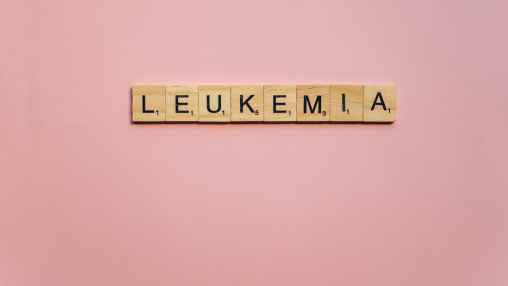
Share this article
Thoughts about resilience from one of our brave and courageous Senior Consultants who has given us the honour of sharing his personal struggles, learnings and joys throughout the diagnosis, and treatment of Leukemia.
In the dark
“Just do your thing! We´ll simply be around and do what´s necessary”. That was how the head physician of the ward welcomed me when I returned to hospital. This time it was for my stem cell transplantation and I wasn´t sure what the doctor wanted to say. It felt a bit as if he was turning things upside down. To me, doing “my thing” was definitely not compatible with a stay in an isolated room on an isolated ward in a megalomanic 1970s concrete “clinic of maximum treatment” that had the charm of a slaughterhouse.
Over the following weeks of my stay, however, I would learn. Without being aware, I had done “my thing” even before my return. Basically, it was about the difference of being a victim or being the master of my own destiny, something that I used to speak about quite often whenever I accompanied an organisation through a change process. However, this difference seemed to be obsolete when half a year before I was confronted with the diagnosis of leukemia. It hit me out of the blue and I felt as if I had lost all control over my life and my future.
Up to that point I had been healthy almost all my life. No pills to be taken, I was fit, bouncing around, and I also felt I was at the peak of my professional life. Then, one morning, when I was standing in front of the bathroom mirror in my Wannsee office in Berlin, I noticed a little knot on the front of my neck, just beside my throat. It was something like a hazelnut, movable under the skin. It did not hurt, it simply didn´t belong there. I went to see my doctor, who checked it and then decided that a specialist should be consulted. On I went to the next hospital, which was in Potsdam, saw an ENT specialist, and after several checks including my blood, I got the diagnosis: leukemia.
This all happened within one day. When I left my home that morning, I had no idea that I would not come back for several months. The diagnosis from the lab arrived in the early evening and the doctor told me that he was not willing to let me go but wanted me to stay in hospital straight away. I gave my neighbour a call, who had a key to my apartment and office and asked him to grab some clothes, pyjamas and my toiletry bag. Then I went up to the intensive care unit, lay down in a bed and got the first of countless infusions. An antibiotic, to stop the inflammation that had already started to flourish, and to lower the fever, that had gone up rapidly.
It took that night and the entire next day, before my diagnosis really sunk in. It wasn´t even a shock, it just took time to trickle down from my ear to my brain to my guts. There was no denial, it was more that something completely unexpected had happened, that I had to digest mentally and emotionally. My mother had passed away not long before at the age of 101, so I felt safe being blessed with good genes. However, leukemia does have a genetic root cause. I started to understand what all this meant, and the discussions with the doctors about consequences and possible treatments had helped me to gain even more clarity.
See the challenge: Tel Quel
“Tel Quel” is obviously French, and it translates into “as it is”. “Tel Quel” is a clause that is sometimes used in sales contracts, and it means that the receiver will accept a delivery “as it is”. Just assume you are a car dealer, and you buy 20 decommissioned cars that have been used by the police before. You get some basic information like year of manufacture and mileage. Based on that you buy the entire stock, most likely via an internet auction. There is no chance to inspect each single car, you buy “Tel Quel” and must not complain about probable defects later.
If you get a diagnosis like leukemia then a very natural reaction is: Why me? What have I done to deserve this? Why is it me who has been hit by this? Why was I chosen (as if there was someone or something that has made a choice)? It´s a question about justice basically, and you don´t see any fairness in life then. Others go on as always, whereas you might not go on at all. So again: Why me?
In many, maybe even in most contexts, it makes a lot of sense to ask this question. In case you find yourself again and again in relationships, that turn out to be unsatisfactory or even toxic, then you have every reason to look for your own contribution to this. To ask the question “Why me?” might help you to disclose some behavioral patterns on your side that you then want to change.
When it comes to leukemia, all of this doesn´t really help. The root causes for leukemia are mutations on some genes that happen over time. In terms of external factors that can trigger these mutations, then you´ll find exposure to x-rays, radioactivity and to benzenes. Some scientists argue that smoking might increase the risk for leukemia (due to the benzenes in cigarettes), but even that seems to be questionable. None of these factors can really be assumed in my case. Exposure to toxins has never happened, at least as far as I know. And when it comes to smoking, I´ve been a non-smoker all my life.
If you can´t stop asking “Why me”, you probably end up with metaphysics. Is it a punishment for what you´ve done in a previous life? Or in your current life? Is it a test of your faith, as it was in Job´s case? It´s not that I don´t have any sense of spirituality, but I didn´t feel like this was helpful for me. The need for justice is a very human one, and it´s essential for creating a society. However, it´s a human concept, whereas some natural processes are “blind”. The earthquake in Lisbon in 1755 was a prominent example, and history has added a lot to that over the last hundreds of years. Philosophers refer to it sometimes as the problem of the “theodicy”, but none of the answers given so far is satisfactory.
What helped me was “Tel Quel”. To accept reality put me back into the driver’s seat, instead of feeling victimised by destiny. When I arrived at “Tel Quel” I started to manage the process that would follow and took on my share of responsibility for it.
My learning
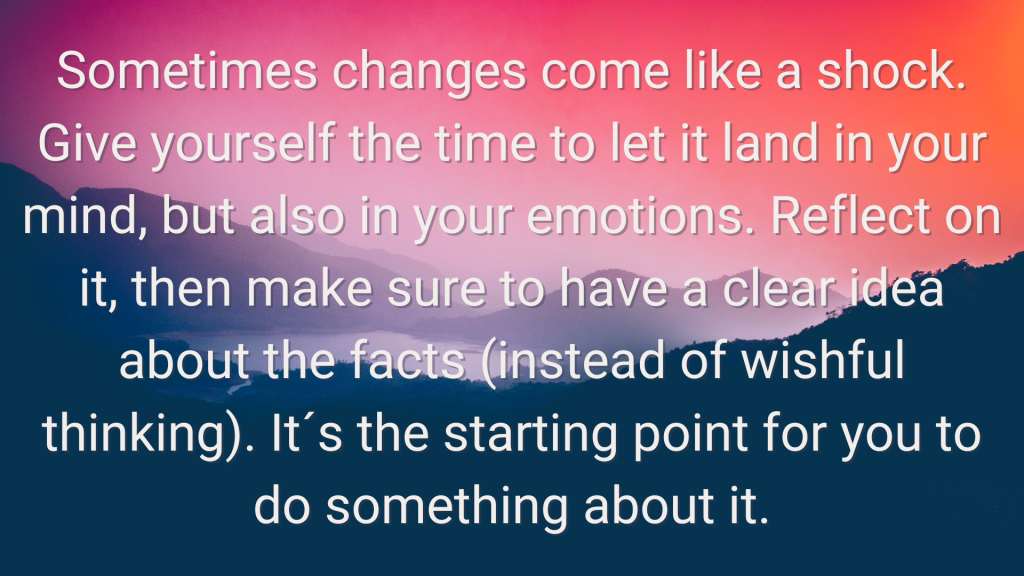
Getting started
Still being in Potsdam in hospital, I started to arrange the next steps. Before planning, however, I had a very emotional thing to do: I had to inform my family and some friends. The first call I had was with my wife, who was in our family home in Hannover (my Berlin office was established many years ago due to a professional change and meant as a provisional arrangement first. Stopgaps can last a long time…). She took it with all the bravery I always knew of her. I noticed the shock and the fear around me, of course, but it was subtle and less explicit. It was her tone and the way I heard her breathe. She instantly thought about how she could organise some help, and indeed I would need a lot of help over the next weeks and months.
The calls with my kids were even more difficult. My son, who had left home already and had started with his studies in another town, almost collapsed when I shared the news. We´ve always been very close, and it´s not just the two of us but also others who see us as being of the same kind. For him it was a terrible shock. What calmed him down was that we instantly discussed what could be done in terms of treatment. It made him aware that the diagnosis was not a death sentence, but that there was hope for recovery.
My daughter, young but brave like my wife, audibly swallowed her tears and listened to what I was saying about the diagnosis, but also about treatment. It was helpful also for her to realise that there were measures that could be taken and that I was willing to go that way. However, what I noted in this moment (but also on later occasions) is that your family and friends suffer even more from the feeling of being helpless and powerless. You must fight your battle as a patient, but your people also have their fight, and it´s important to pay attention to both.
It was clear at this point that my treatment would involve several chemotherapy sessions, and that this would take several months, with two breaks in between. The doctors in Potsdam offered to start with the first chemo straight away, but they also spoke about alternatives to me. One point was that due to the long duration of the entire process it might be good to be close to the family, for emotional but also for very practical reasons, like being provided with fresh clothes regularly.
This would mean that I had to go to Hannover. I called a friend of mine, an MD too, who holds high ranking positions within the German healthcare system. He knows “God and the world” in this scene, and I asked him for advice. Without knowing about the discussions with the doctors in Potsdam, his instant reply was: “Try to get to the haematology of Medical University in Hannover, headed by professor Ganser. He´s one of the most capable specialists that we have, not only nationwide, but also on an international level. And he is a person with extremely high ethical standards.”
What a coincidence! Hannover was my hometown, and Hannover seemed to have one of the best MDs in this field. However, to simply have the wish to become patient of a particular doctor does not mean that there is a bed available, even more so when this is a well-known capacity. The Potsdam head of department called the Medical University in Hannover (MHH for short) and the unexpected happened: there was a free bed and they were open to receive me as a patient the same day.
What a stroke of luck! My odyssey had started on Monday that week, and on Friday my wife picked me up at Potsdam and chauffeured me back to Hannover. I arrived at MHH late in the afternoon, and over the weekend treatment started.
My learning
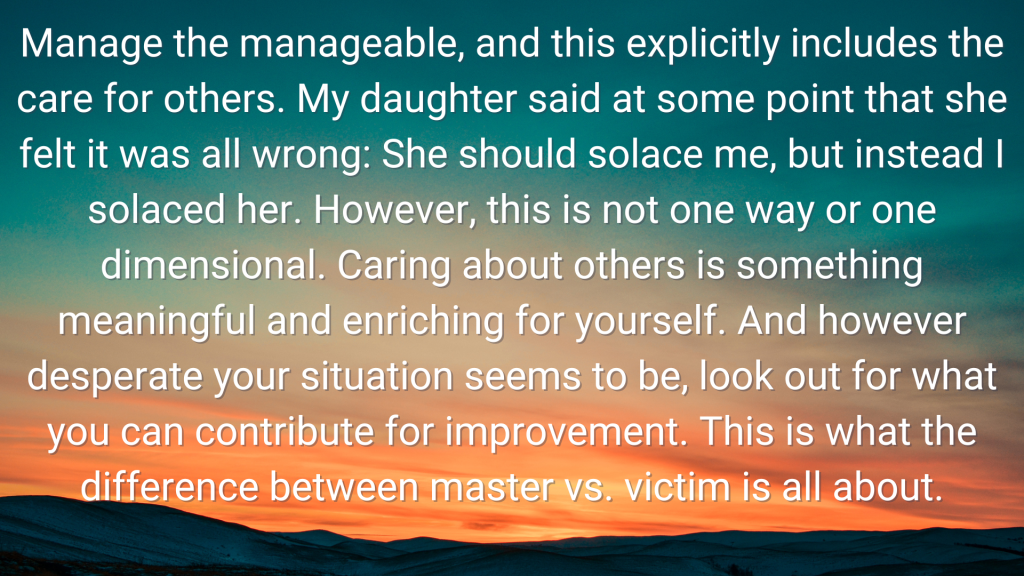
The roll-out of the treatment
On my arrival in Hannover Prof. Ganser, the chief physician, had a careful check of my status. He decided that I had to undergo surgery first. What had started as a little knot on my throat had become a walnut, and his fear was that it would clash with chemotherapy. I got infusions instantly to stabilise and lower the level of cancer cells in my blood, but that was not the “real” chemotherapy yet. I was transferred to the surgeons then, who removed the “walnut”, finding out that a lymph node and a salivary gland had been “baked” together (as the doctors called it) with cancer cells.
The surgery took about two hours, because a facial nerve had been “baked” into the entire mix. When I came back from anesthesia, I saw the doctor´s face over me, asking me to smile. In that moment I felt like anything but smiling, but somehow, I produced a tormented grin. “Great”, the doctor shouted out. “Everything went well!” I then learned that the challenge for the surgeons was to not damage the nerve, in which case half of my face would have been paralysed. Pheeew…
Over the next couple of months, I had a lot of opportunities for tormented grins, but not to lose my sense of humor was one of the most important coping strategies for me. The hospital staff met this need perfectly with their congeniality.
I was taken back to the haematology department where chemotherapy started. Usually, you get chemo three times: induction, consolidation and finally sustainment. The induction already has the target to kill all the cancer cells and to achieve a status of “full remission”, which is the technical term. There is no guarantee, however, that this happens, but in my case it did. After the induction, my blood and my bone marrow did not show any detectable cancer cells.
Great success, but the chemo itself was somewhat of a nightmare. I wasn´t in the best shape when the chemo started, having had surgery and a week in another hospital behind me. The toxins (and that´s what you get) hit a weakened organism. The worst period, however, began when the infusions were stopped. The body instantly starts to discard the toxins, and at the same time you go into what´s called aplasia. That means that no (or almost no) new blood cells are produced by your bone marrow, and that your immune system is completely down. So are you.
You fall into fatigue, which means that you are completely lethargic. Not just tired, you are simply unable and unwilling to do anything. Even the easiest things become a tough challenge, and your drive and energy are gone. I remember how long it took to simply take my evening dose of pills, 4 in total. Just to get started needed all my willpower, and after the first one I had to have a break. And so on, it was a “project” that took some 20 minutes, also because swallowing causes a lot of pain.
Since your body discards the toxins via all possible ways, kidneys, liver and skin, hygiene is a must. You are urged to take a shower every morning and in the evening again. You also change the bedclothes every day, and you do it yourself. It´s the physical activity you need to get over the fatigue, but after having shared what it means to just take a few pills, you can imagine what effort it was to shower and make a bed.
The medical staff are complete geniuses. It´s not just their technical knowledge but also their empathy in combination with persistence. In the aplastic phase in particular a physiotherapist was around to make me move with some simple exercises. Having taken my pills, had my shower and made my bed, I was knocked out for the rest of the day, and the last thing I wanted was physical exercises. When she showed up, I often refused to do something. She would smile at me then and say: “Yes of course, to take a shower is very exhausting for you. I´ll just see another patient and come back to you in an hour.” That´s what she did, and maybe I could get rid of her a second time, but when she came back for the third time, I usually surrendered. That´s how I made my way back.
My learning
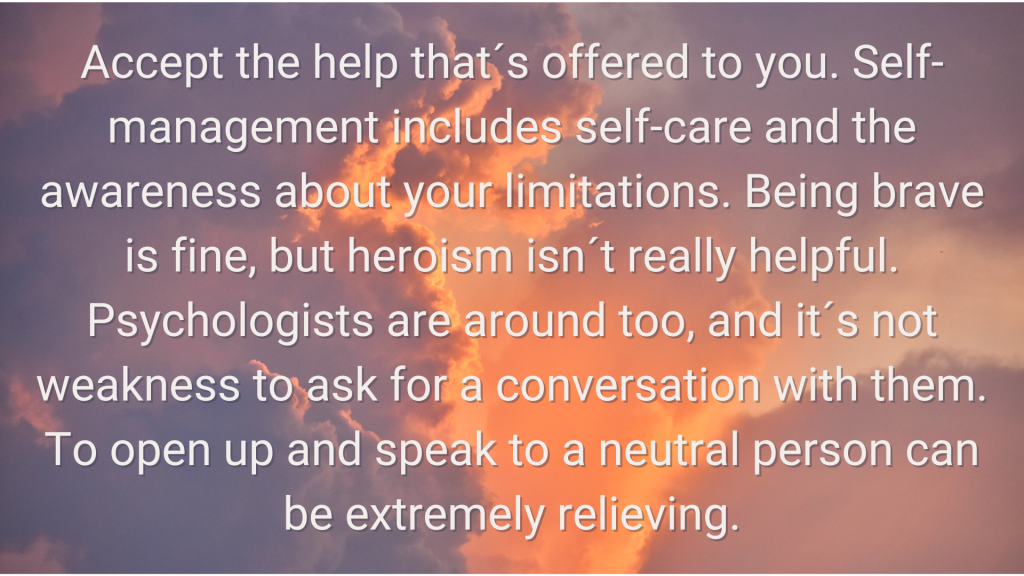
First results
It took a while before recovery started, and it was a painful journey back to health. Aplasia and fatigue were one aspect, mucositis another one. Mucositis, in simple words, is an infection of the oral mucosa, and it comes as a side effect of chemotherapy. It´s extremely painful, and for a week or so I was unable to eat and even speak. I got artificial feeding instead, then I could start eating again, with soups, yoghurt and other creamed foods.
We shared jokes about the artificial feeding: a disgusting looking grey gloop in a transparent plastic bag that’s transfused into your vein. You wouldn´t eat it if it was offered to you in a bowl for breakfast. At 5 in the morning a nurse would show up to draw a few injections from your vein for the first diagnostics. She had introduced herself as “the vampire”, so I knew about her affinity for humour. After having had several of these bags of artificial nutrition I started a discussion about “the real business model” of the hospital. “Look”, I said, “I´ve got it now. You fill some cheap random stuff into my body, wait for the transformation to happen and then you take out precious blood again.” She gave me a conspiratorial smile and replied: “Don´t tell this to anyone else.”
After having spent almost two months in hospital, I was fit enough to be released for further rehabilitation. These two months had included Christmas and New Year, not the best time to be separated from family and friends and bound to a hospital bed instead. Anyway, the nurses were extremely caring, and with friends and family I exchanged message after message. A fellow patient presented me with a walnut shell, in which he had tinkered a tiny little Christmas crib. My wife sent me four battery-powered little candles, and those were my decorations. I was happy with it.
My learning
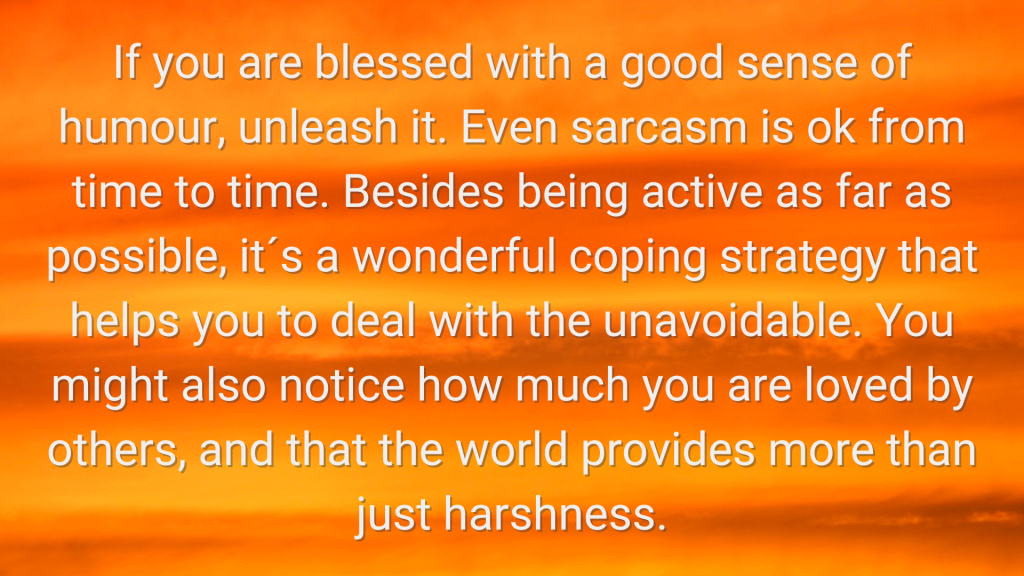
Interim balance, adjustments and further roll-out
To simply be back home after six weeks in hospital felt unbelievably great. The people around me cared a lot, I was provided with much comfort and love. Energy came back relatively quick, since I was in “full remission”, without any detectable cancer cells. The first chemo had done its job extremely well, but the next bad news was waiting for me already.
I went to hospital twice a week in this period to be checked for a possible relapse or other problems. All was going well until one day the doctor welcomed me with another diagnostic result from gene sequencing. They had found a defect on a specific gene that made my leukemia “high risk”. That meant that the risk of relapse was very high and the period for this to occur was about one year.
There were two options: enter a circle of relapse, next chemo, again a relapse and a further chemo then get a stem cell transplant in a very weak body or, have the transplant straight away (which was the doctor’s clear recommendation). This was what I had feared since I had read a lot about stem cell transplants, the risks, and the possible side effects. It didn´t sound pleasant, and I was all but keen to undergo this procedure, but statistics were crystal clear. In my condition, the chances of survival were 20%, the chances of dying about 80%. Getting a stem cell transplant would reverse these statistics.
With a heavy heart I agreed to the transplant so research for a donor was started while I was still recovering from the first chemo. Luck was on my side again as not only was a donor found but it was the perfect match. There are so called HLA markers that should be identical in the ideal case. If a donor with 100% of overlap couldn´t be found, my doctor was willing to go down to 80% of overlap, but everything that was not a match would increase the risk to fail or to produce rejections later. In my case, the donor had 100% identical HLA markers. What’s more, he was a young male with an identical blood group. Not a necessity, you can get a donation from the opposite sex with different blood group, but anything that does not require your system to adjust to something new is beneficial.
To ‘‘pass’’ the time until getting the donation, I got a shortened consolidation therapy, just to make sure that no new cancer cells would emerge. My recovery from the first high dose chemo continued but I had enough energy to close my Berlin office and move my stuff back to our house near Hannover. There were two reasons for that, only one of which I communicated with my family: I wanted to minimise costs, since I couldn´t work and had to survive on indemnity for sickness. The second reason was to not leave behind any trouble for the family, in case I should not survive, but that I kept for myself.
After having enjoyed some three months of recovery with a quick consolidation in between, I went back to hospital to receive my new stem cells. It felt strange. When I went to hospital for the first time, I was sick, but this time I felt energetic, like putting a new project into practice. My first remark to the doctor therefore was, he shouldn´t dare to release me in a worse condition than on my arrival. That was when I heard the sentence that I´ve quoted at the very beginning: “You do your thing, and we´ll just be around and do what´s necessary”.
That´s what happened. Over the first days, I got what´s called conditioning: a high dose of toxins to simply erase the existing immune and haematopoietic system. In a way it´s strange, because anything that had happened so far was to restore the existing system, and now it should be killed. Anyway, in case cells from the new and the old system met, it would mean the certain death of the receiver. Anything from the old system had to be wiped out, before I could get the donation.
This time I was prepared for what was coming. Again aplasia, fatigue, mucositis. I got two days to gain back some energy then the donation was transplanted. Emotionally it´s a dramatic moment because you are aware that you get something that is not “your own”. Your body is the host now for stem cells of other origin, but it must “welcome” these stem cells, because they will help it to survive. Technically, it´s a very unspectacular procedure. It´s an organ transplant, although it doesn´t match our idea about what “transplant” normally means. In very simple words: If you get, let´s say, a new kidney, then a surgeon will come, open your abdomen, take the not functioning kidney out and replace it with a new one.
In the case of a stem cell transplant, there is no surgery whatsoever. “Taking out the defective organ” was done via toxins in the conditioning phase. “Implanting” the new organ was very much like the transfusion of some blood. The donation came in plastic bags, like any other blood bottle. It came in three bags, and it was given to me via three injections. A nurse could have done it, I´m sure, but of course it had to be a doctor, due to liability issues. After 90 minutes it was done, and I was on my own again. The new stem cells would find their place by themselves and adhere, another enigma in the entire process.
The following night was the worst ever. I circulated between the bath and the bed in 20-minute intervals. Nausea, diarrhea, every bad symptom you can imagine. My body was flooded with medicines, first of all a saline solution to compensate the loss of liquid. Painkillers and other stuff on top, and last but not least a diuretic, to help my kidneys to cope with the floods. It´s pretty much what happens most of the time: You get medication for something, but it causes adverse side effects. You get another drug for the side effects, and finally you get a third dose of something to flush out the toxins. In these weeks you understand what your body can put up with.
If everything goes well, your body will accept the new stem cells. Your survival over the first three months, however, depends on heavy immune suppression, otherwise your body would reject the new haematopoietic system. Compared to other organ transplants: if you get a new kidney, your immune system would recognise the new organ as “alien” and as something, that must be defeated. A strong rejection would be the result, and you would lose your new organ. That´s why you need to take immune suppressive drugs for the rest of your life.
In the case of an immune system transplant, the new system itself is “the alien”, but it will recognise it´s new environment (which is your body) as “the enemy”, that needs to be defeated. It will attack anything else, and you would survive this attack only for a few days. However, if everything goes well, your new immune system will get used to the new environment (your body) after a phase of familiarisation. For this phase you need immune suppression, to not allow your new immune system to start working instantly.
Two weeks after the transplant, the “take” occurs, meaning the new stem cells have settled in place and have started to produce new blood cells. These new blood cells will be found in the daily blood analysis, and after a while you have what´s called “chimerism”. Sounds strange, but it means that a certain percentage of your blood cells are coming from the new system. You can have a “mixed chimerism”, which means that some of your blood cells are still “old production”, but in the end a 100% ratio is the target. This is what happened in my case.
My learning
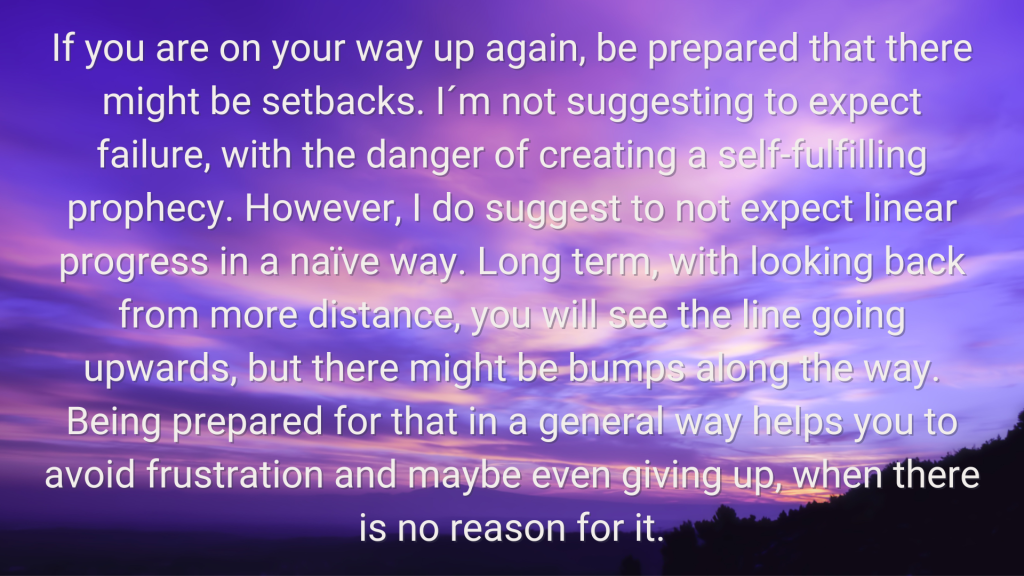
Seeing the results
One morning the doctor came in for his routine wards round. He asked me how I felt (“Good”), then checked the sheet with the results of that morning´s blood analysis. Again he looked at me, again he looked at the data. Then he turned back to me and said: “You know what? I’d rather go and see the people who really need me.” With a little smile he left, and three days later I was released and came back home.
It was three weeks after the transplant which is rather quick. Four to six weeks would be seen as normal, but “I had done my thing”, as the doctor said, and that was of help. Whenever possible, I was sitting in my bed or at my table with my laptop, communicating, designing, reading. I had a book on my bedside table about tours with old cars through southern France, something I was looking forward to. I did a lot of thinking about my future and what I would do when I was back home. In some way, I was looking beyond the hill that was lying in front of me.
The doctors and nurses noticed it and obviously it was of help for my physical recovery too. Looking back, there were many moments of remorse-free selfishness, something I would rarely allow myself under normal circumstances. I´ve always had a strong sense of responsibility. I´m sure it was helpful in many ways, but I probably could have balanced it a bit better with more time for my own needs. The disease and the time needed to cure it freed me to do just this, and I enjoyed it, as strange as it might sound.
The physical result from the disease and the cure is a mild form of what the doctor´s call “graft versus host disease” (gvhd). It´s a process between stem cells and other organs, in my case the oral mucosa. My mouth can be a bit dry sometimes, that´s it. For the doctors it´s just perfect, because a gvhd on this low level indicates that my new immune system is functioning well and would defeat cancer cells in the case they should have survived. On the other hand, this side effect does not really affect my normal life.
The psychological effects go far beyond this. I´m still re-evaluating what´s important for me and what is not. It´s clear that I´m going to continue working but I´ve become pickier about the kind of work I´m doing. It´s also clear that I take more time for myself and my people. My love for nature has increased, and I´m calmer than ever. Some fears that I used to have are almost gone. After all, I´ve faced death and I survived. What should I be afraid of?
By the way: It was a very special moment when I noticed that I could let go. There was no fear, but a great consent with what I had made of my life in general. I used to have the talent of seeing my failures more than my positives. That´s gone. Looking from where I´ve started and what I have achieved, I´m very much at peace with my life and there is a level of serenity that is somehow new.
My learning
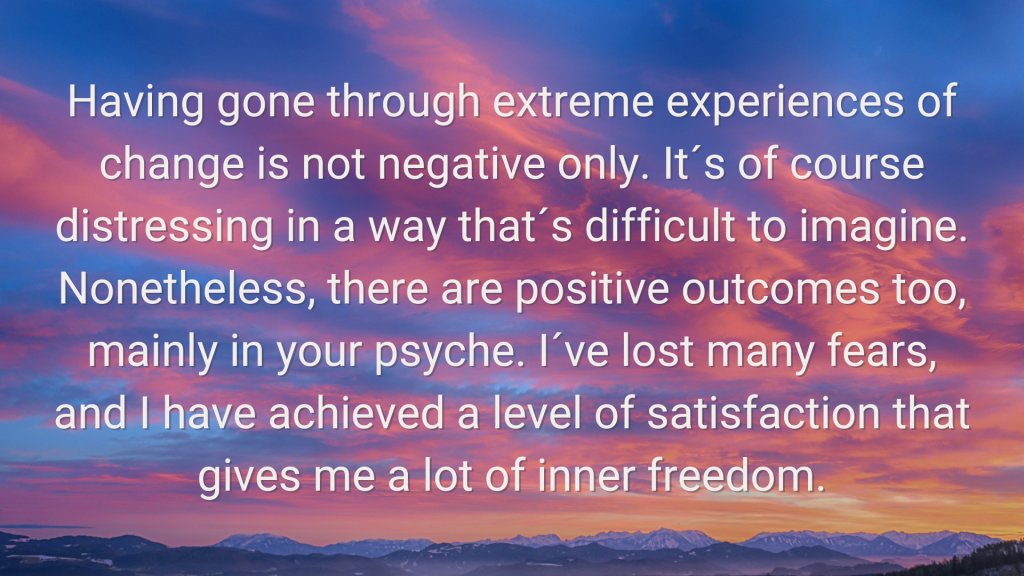
What´s next?
More time for myself and more time with the people I love, that´s one of the learnings. Also it seems the future is more open than ever now. The inner freedom that I´ve mentioned above motivated me to re-look at topics that have played a minor role in previous years. These topics will find their way via story telling into my programs. I´ve always had a need to give space to my creativity, and I feel encouraged to do so more than ever. Not sure what the outcome will be, but I´m really looking forward to it.
Ends
If you have got this far, please take a moment to absorb the many positive learnings shared in this personal and honest reflection, and share this positivity with others that may need help building their resilience.